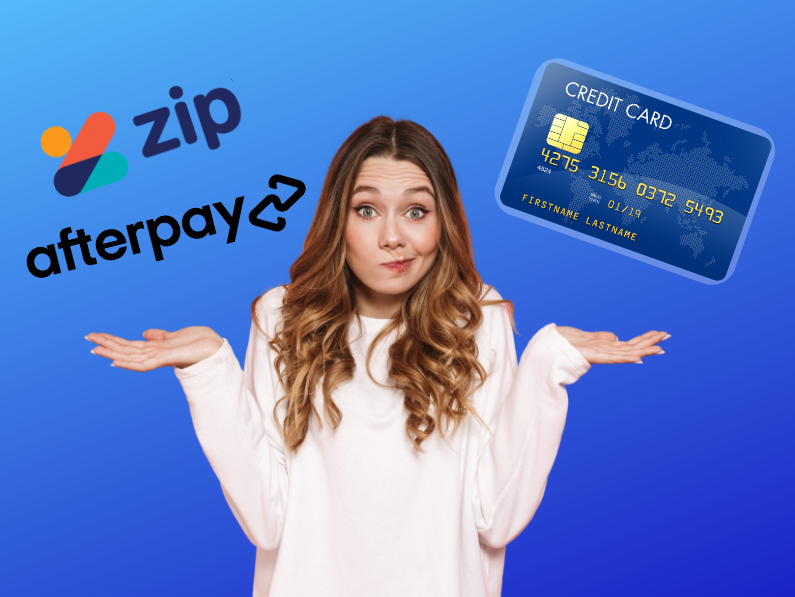We answer your biggest questions about Buy Now Pay Later. How does it work, what are the fees, how does it affect my credit rating, what are the catches and will I be able to still get a home loan? Let’s find out.
What is it?
Buy now pay later is big, really big. In fact, it’s massive… referred to as BNPL for short the new credit system is now worth around $750 million, and this is expected to grow into the billions in the not too distant future.
There are many players, Afterpay being the largest, Zip being the second largest. Everyday there seems to be another player on the market, as new and existing entrants to the BNPL boom scramble for a seat at the BNPL table. Splitip, Sezzle, Laybuy, Zebit, Openpay, Humm, Bundll.. It’s a big table.
Afterpay, the largest player in the buy now pay later space, now services over 3.5 million Australians and 10 million worldwide. During Covid these numbers were increasing at a rate of 20,000 new customers per day…. Jesus. I guess we have all seen the ads by now, there may even be one on this video if you are lucky…
“You should totally buy that now… and pay for it later”….. OK IM IN.
Zip the second largest services over 2 million aussies and is also growing rapidly. Zip now offers Zip and tap, a physical in store service and also interestingly it offers businesses the chance to buy supplies through BNPL, and Facebook ads also with over 22,000 retail customers so far.
With names like Google, Facebook and Ebay as partners BNPL is basically a race to get friends for these guys at the moment.
Experts expect the buy now pay later market to double by 2023, I personally think that is conservative given the appeal of the service.
In this article, we discover if BNPL is worth checking out, or is it the drunk person at the party?
And should you stick with good old faithful credit cards, who you know, and trust, but don’t like. You definitely don’t like credit cards.
How does it work?
It is what it sounds like, buy now pay later. You buy the thing, then pay for it later.
Afterpay takes one payment when you buy it and the other three over the coming 3 fortnights. Zip doesn’t take anything up front, and you then choose how to repay, either weekly, fortnightly or monthly. Both offer fairly low entry level limits around $1,000 to start. Both also claim to be easy to use, and easy to sign up for.
Afterpay and Zip charge the retailer you buy from a fee and then make money from you in the form of late fees. More on that below.
Credit cards allow you to purchase freely, so long as you repay before the end of the interest free period, usually 50 days or so. Going over will mean you are charged interest on the balance. Limits can be anything and fees vary greatly also.
What are the fees?
Afterpay charges a $10 fee if you miss a repayment, (fees are tax deductible for businesses that use BNPL fyi) maximum of $68 per order over $272 and a maximum of 25% on orders between $40 and $272. So if you buy 4 things for $250 and don’t pay on time, you could face penalty fees up to $250 (25%). Wow.
Zip charges a monthly account fee of $6, but this is only charged when you have an outstanding balance at the end of the month. Also orders not paid off by the interest free period will then incur fees of 19.9% per annum. Yep no surprises here.
Other BNPL providers’ fees vary, but is usually some variant of the two major players above.
Fees can really add up quickly, and they are banking on that happening. Get it, banking..
Something like one in 5 incur a penalty every 12 months. I would think it’s more than that.
This will 100% be regulated eventually, or changed. There is an industry code on its way in 2021 that claims to be:
“A robust code that is outcomes-focused, accommodates the different business models in the industry (including emerging models where possible), and has strong review and compliance mechanisms that can help promote good consumer outcomes in line with community expectations.”
The code of practice will be rolled out in 2021… and definitely does not sound like a total load of horse sh**.
What about credit cards, it’s actually very similar. Pay it back before 50 days or whatever the terms of your card and you won’t be charged, however, miss that repayment and be charged up to 22% in fees on the outstanding balance. Many have an annual fee also.
CAUTION: Many use credit cards to make BNPL payments also, potentially doubling fees. Do not do this. Use a debit card.
How does it affect my credit rating?
Your credit rating is a number the bank / financial institutions come up with by looking into your financial history with various service providers. Such as phone providers, water bills, loans, credit cards etc. If you pay them early or on time you get a higher score. Default or pay late and you get a lower score, don’t pay at all and you get a black mark on your credit rating and you basically won’t ever get a loan.
Why does my credit score matter? To see if you are reliable with money. I would rather lend money to a Lanister who always pays their debts than someone who pays them sometimes, too soon for GoT? Gee they really f***ed that up didn’t they.
The score affects how high the interest rate may be, how much they may lend you and if you will get a loan at all.
You can check your credit score here at getcreditscore.com.au if you are curious. It’s a free service so it’s worth looking at to see if you have any unpaid parking fines from that big night out when you were 19 and your car got towed.
In summary, they know if you are good with debt or bad with it, the better you are, the higher the score, the easier and cheaper it is to get loans.
So how about BNPL and my credit rating.
Afterpay does not check your credit score when you sign up (though they ask you to authorise them if they decide to later), this means that broadly speaking Afterpay will not count towards a better credit score…. Conversely, it will also not count towards a negative score either. More on that shortly.
Waaaaa that’s crazy, how is this allowed!! Yes, yes it is crazy.
If you default, however, they may report ‘negative activity’ to authorities (likely only serious misuse, like never repaying the amounts at all).
Zip does check your credit score on sign up and reports that they do not report your defaults against your credit score. How is this ok… oh it’s how they make the money, when you can’t pay and they fine you.
Most BNPL will perform a credit check either when you sign up or when you make a purchase, just to make sure you can make the repayments. Whilst this may not affect your credit score, it will be on your credit report showing you have an account and the limit on said account.
If you miss a monthly minimum on a credit card you will be charged interest on the amount not paid, and it will negatively affect your credit score.
So BNPL is sounding like a better option so far right? You get the debt and you may not even get in trouble if you miss a repayment. What could go wrong.
What about all the other BNPL, humm, Bundll, Laybuy, openpay bla bla.. They are all slightly different here, some report your defaults however most do not. This means broadly speaking most BNPL will neither positively or negatively affect your credit score.
Are there any catches?
The risk here is that if you don’t perform a credit check on a new customer, they could be flat broke and simply unable to repay. This is irresponsible lending and I don’t know why this is allowed. Most do check however, other than the largest interestingly, Afterpay.. Too busy making money I guess.
The BNPL is due for some regulation, and as I mentioned previously it’s on its way. Governments are always slow to respond with legislation to these things. That and they are too busy with a royal commission into fraudulent banks that we are just going to wipe under the table a year later so ‘encourage spending’ and boost the economy.. Seriously… I don’t know who is kissing who or what here, but there is some serious kissing going on.
Some BNPL will report against your credit score but many do not. So penalty free in some cases right? Well other than the fee they charge.
That’s all they care about though let’s be honest, they don’t report you for defaulting because they prefer you default and pay the late fee. They don’t want you worrying about your pesky credit rating, default without worry, just pay the fee right…
There is also a general lack of transparency by these companies, which makes it harder for consumers to know the risks of using a product. Banks are the same. I mean it’s in the product disclosure statements I’m sure.. You’ve read one of those right?
Thoughts and objective advice
Credit cards suck. 1% on savings and 22% on spending, guys, what the hell. I’m not surprised there is competition. Credit cards and BNPL are so similar in many ways, they charge you potentially massive fees when you pay back late, they can both penalise your score for being unreliable and in all honesty, they both bury the wording of this in fine print because they want you to default and pay fees.
Both credit cards and BNPL are terrible systems designed to prey on those who cannot manage it. ASIC says that 20% of BNPL customers cut back on or went without essentials such as meals, 15% took out other loans and 20% missed or were late to pay.
Having said that, BNPL is definitely not any worse than a traditional credit card, it may even be better and cheaper depending on how you use it. BNPL was born because credit cards suck and people are looking for alternatives. Unfortunately BNPL is so new that it has banks scared, and this means they are cautious with it when you apply for a loan.
If you plan on taking any of the BNPL or credit card products out there, you MUST pay them on time and manage them properly or you SHOULD not have them at all.
Oh what about Afterpay because it may not affect my credit rating if i default…. NO, stop it.. No.
Afterpay not performing a credit check, and not counting towards a credit rating, to me this makes the debt pointless. No points for playing, it’s like running a race and at the end, even though you win, there’s no one there, no prize, nothing… you just walk off. Oh cool. Why the f*** did I just do that..
At least with a credit card you get the points for playing.
Zip does check your score on signup however, to make sure you aren’t broke. Again no bonus points for paying on time either. It’s the same thing as Afterpay if you ask me, pointless.
BNPL is basically a credit card rebranded as not a credit card.
You would honestly prefer them to report your behaviour in exchange for the good rating, that way you get points for doing the right thing.
In all cases you should have a budget, stick to it, limit your spending and manage debt well, have savings targets and stick to them and avoid buying what you don’t need. Especially when saving for a home.
So will I get a loan?
We deal with this all the time, whilst your credit rating may not be directly impacted by BNPL, banks will review your bank statements in most loan applications. This is so important to understand when preparing for a loan. Make sure your statements look good, avoid spending thousands on scratchies going out for dinner or any unnecessary spending, banks will now review your habits and can hold them against you.
BNPL is the same in that if the bank sees payments they may make enquiries about how much you are spending, what your limit is with the BNPL provider, whether you are defaulting etc.
An account with a BNPL provider (whether it is drawn down or not) will often be counted as a debt and reduce what you can borrow. This is exactly the same as a credit card, if you have a 10k limit and it’s not drawn down at all it will still count in full as a debt and reduce what you can borrow.
This is because at any moment you can draw it down and that will affect your ability to repay another loan.
If you have a credit card, an Afterpay account and a Zip account and they are all on your statements, banks will be thinking, can this person manage their money what’s going here? No loan for you.
Banks are nervous and cautious these days, BNPL is another question mark that can serve to make you more risky for banks or borrowers.
If you want to get a loan, you should aim to reduce any forms of credit cards or BNPL debt altogether.
However, keeping either a credit card or a BNPL around for minimal and well managed use should not significantly hold you back from borrowing.
BONUS QUESTION & SUMMARY
Should I avoid the credit system all together?
Great question, now you are really talking! Should you bother with BNPL or a credit card at all?
For the record, I am against both systems. I am also against the home loan system, an average home loan of $500,000 will result in you paying the bank over $1,000,000. That’s over double the amount in non-deductible interest. What the hell.
Having said that, you MUST play the game, and therefore yes, yes you should get a credit card. Small, low interest and no or low fee cards are a great way to build a stronger credit score. 1-3 thousand dollars for an adult on an average salary is a healthy way to build a credit score and have your borrowing capacity affected minimally. Have it and don’t use it, or use it and pay for it on time, it’s simple.
BNPL is the same. Keep your limit small and keep your repayments squeaky clean, and you will be ok.
Perhaps choose BNPL or a credit card depending on what suits you, but not both to be safe.
Having said all that, I prefer credit cards to buy now pay later as you can easily avoid the fees by using it the same way as BNPL. If managed well you get a longer interest free payback period and an improved credit score for paying it off on time.
You must read and understand the fees that will apply for any product you have.
Some people tout rewards credit cards, for those who spend big for business, and you may be able to get some net reward here. If you manage it extremely well and track any surcharges and fees like a hawk. More often than not these cost much more in fees than they pay in rewards.
Lastly remember, banks want to borrow, it’s how they make money. They just don’t want to (and are not allowed to) lend money to people who cannot afford or manage their money.
You want a bank loan, play the bank’s rules, but play them on your terms. Show that you can practice habits like paying bills early and keeping credit limits paid down and low, and you will be fine.
Banks will lend to those who can show money management skills, however, people with 3 credit cards drawn down, paid late and Afterpay running with penalties on each monthly bank statement… no.
bookkeeping







